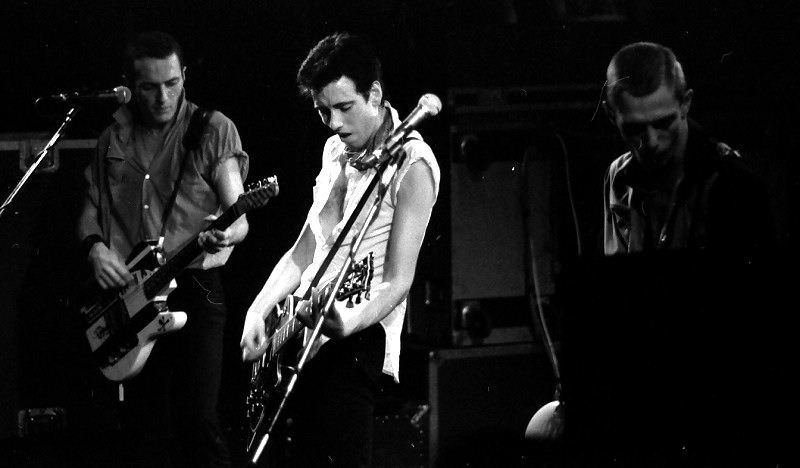
The Clash’s music is as vital as ever. Right now, we’ll consider a small sample of their important contribution to the canon of protest songs.
White Riot (1977)
“White Riot” was the band’s first single, and it appeared on their self-titled debut. The song tackles issues of race and class. The song was also influenced by the 1976 riots at Notting Hill Carnival, in which band members Joe Strummer and Paul Simonon were both involved. The riot was motivated by the police oppression that London’s Caribbean residents were experiencing. The tune is a rallying cry against white passiveness.
Complete Control (1977)
“Complete Control” was originally released as a single in 1977 and was included on the 1979 US release of their debut album. The song was partly in response to their record company releasing “Remote Control” as a single without consulting the band. The tune addresses the band’s battles with maintaining their independence and punk ideals within a system based on capitalism.
English Civil War (1978)
“English Civil War” from the band’s 1978 sophomore album, Give Em’ Enough Rope, is a reworking of the traditional American Civil War tune, “When Johnny Comes Marching Home”. The modern update addresses the potential for civil war in the UK with the rise of far rights group such as the British National Front. The song also resonates with the current rise of the alt-right in the USA.
(White Man) In Hammersmith Palais (1978)
Recorded during the sessions for Give Em’ Enough Rope“, (White Man) In Hammersmith Palais” was originally released as a non-album single. It ended up being included on the US release of their debut album. The song addresses various issues, such as institutionalized racism and systemic poverty. The song also addresses concerns over the radicalization of the UK (“If Adolf Hitler flew in today, they’d send a limousine anyway”).
London Calling (1979)
The title track of the band’s iconic 1979 album is an ominous tune that tackles a variety of issues including the Three Mile Island incident (“a nuclear error”) and concerns of the potential flooding of the River Thames (“London is drowning”). Joe Strummer made the following statement concerning the motivation of the song: “We felt that we were struggling about to slip down a slope or something, grasping with our fingernails. And there was no one there to help us.”
Armagideon Time (1979)
Reggae had a huge influence on the development of The Clash’s music and they’ve covered a number of reggae tunes. “Armagideon Time” is an example of this. The song was originally released as a single in 1978 by Willi Williams. The Clash’s ominous rendering was included as an appropriate b-side to “London Calling”.
Spanish Bombs (1979)
“Spanish Bombs” is one of the many gems from London Calling. Strummer wrote the tune in response to the ETA terrorist bombings that have taken place in Costa Brava, Spain. The song also compared current events with the Spanish Civil War. Strummer was an expert at extrapolating lessons from history with the hope that listeners would learn from the mistakes of the past. Sadly, history has a way of continuing to repeat itself.
Washington Bullets (1980)
“Washington Bullets” is from The Clash’s ambitious triple album, Sandinista! The song is a pointed critique of the USA foreign policy and how it has contributed to great bloodshed.
Straight To Hell (1982)
“Straight To Hell” appears on the album Combat Rock. The lyrics protest against many social injustices, such as economic issues, the plight of immigrants, and racism. The tune was also notably sampled in M.I.A.’s 2007 hit, “Paper Planes”.
This Is England (1985)
“This Is England” is from The Clash 6th and final studio album, Cut The Crap. The album was much maligned (and for good reason), but the song is truly an underrated gem. In some ways, it can be compared to Bruce Springsteen’s “Born In The USA”. If you’re only listening to the chorus you might erroneously conclude it is a patriotic tune, but a close listen to the lyrics you realize it is an indictment of Margaret Thatcher’s England (just like Springsteen was indicting the US treatment of Vietnam veterans). Just like with Springsteen, Strummer was able to articulate the human plight. That is why The Clash continues to be relevant.